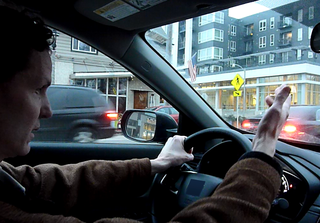Anger
7 Reasons We’re More Biased While Driving
Why does being behind the wheel make us so quick to anger and misjudgment?
Posted December 23, 2018

Have you ever gotten upset at another driver? Have other drivers ever seemed upset at you? Anger is more common while driving than almost any other everyday activity. The most common thought while driving is that another driver is incompetent (Britt & Garrity, 2003; James & Nahl, 2000; Wickens et al., 2013).
What’s going on?
Maybe a lot of drivers just do a lot of stupid and rude things. Common complaints include tailgating, cutting, driving too slowly, driving too fast, driving on the shoulder, not using turn signals, braking erratically, refusing lane access, weaving, and stealing parking spaces.
When we face these driving issues, we usually don’t let the other driver off the hook. We may mutter or gesture or honk. But most of all we blame the other driver. We tend to see the other driver as rude or incompetent.
The thing is that, statistically speaking, most of us engage in similar behaviors, but we usually don’t get upset at ourselves. We don’t call ourselves rude or incompetent or idiots. We have good reason for tailgating sometimes. We’re late for something important, and the driver in front of us is driving too slowly.
We have good reason for driving slowly or accelerating slowly sometimes, like when we’re looking for a street sign or when our car is in need of repair (or replacement). Some of us may be emotionally recovering from a car accident and so driving more cautiously than usual.
We might drive really fast or on the shoulder due to a personal emergency. My brother and his wife sped like maniacs to the hospital when she was about to give birth. They didn’t make it in time and named their son after their car. It turns out that having babies in cars is more common than most of us think (Miller, 2017).
We might refuse lane access but not on purpose. We didn’t see you there. We had an in-car distraction.
It’s normal not to judge ourselves harshly even after getting angry at another driver for the same behavior. Yes, it’s quite the double standards, but in moderation, it’s mentally healthy to protect our egos this way (Taylor, 1989).
Another reason we judge ourselves less harshly is because we know what’s going on in our own situations. We know what we’re running late for. We know our car’s limitations. We know what our emergency is or what our kids our doing in the back seat that’s distracting us. There are countless other situational factors beyond what I can list here. (Not that any of these factors automatically excuse “bad driving,” but they do undercut the accusation of simply being an idiot driver.)
If we know about these factors in our own situations, why can’t we consider them as possible factors for the other driver? That’s the big question. Not considering others’ potential situational factors is a very common bias called the fundamental attribution error (FAE).
The FAE occurs in countless contexts (Stalder, 2018), but it’s especially likely on the road while driving. There are at least seven reasons why.
1. High frequency of driving anger
The common complaints above can make us irritated or angry while driving. In some cases, we simply feel blocked in our goal to get somewhere, and goal blockage is a common recipe for frustration, aggression, and anger. According to anger researchers, anger is fundamentally “an attribution of blame” (Averill, 1983). And we don’t usually blame ourselves. A number of studies have also shown that anger for any reason increases the FAE.

2. Traffic congestion
When the traffic gets heavier, such as during rush hour, holiday shopping, or bad weather, it’s a form of crowding. Crowds not only block us in our goal of getting somewhere but also can increase our physiological arousal, stress level, and proneness to frustration and anger. And as stated above, anger increases the FAE.
3. Anonymity
We are in our own cab. We can hurl insults at the other driver without being heard or seen. Even if the other driver sees our gestures (a risky circumstance), they don’t know who we are. Under conditions of anonymity, people tend to be nastier and more judgmental.
4. Lack of accountability
Part of the power of anonymity is a lack of accountability. Research shows feeling accountable for our judgments reduces the FAE, but if we’re alone in the cab, there’s no one to account to. Driving with passengers raises the interesting possibility that felt accountability is higher, but usually our passengers are on our side and will join us in cursing the idiot who cut us off or stole our parking spot.
5. Limits in cross-car communication
Even if you wanted to hold yourself accountable and to justify your harsh judgment to the driver who offended you, there’s usually no reliable way to do so while driving. Similarly, the other driver cannot explain their situation to you. Even if you both knew sign language, the encounter is probably too brief to utilize it. In a face-to-face conflict, on the other hand, the person you get angry at can interrupt you to explain or can apologize and show themselves to be decent.
6. Divided attention
Although some of us are better at multitasking than others, driving safely often involves keeping our eyes and attention on multiple places which calls for more cognitive effort. And research shows that increasing cognitive load increases the FAE. On top of this typically elevated load, drivers are usually further distracted by a number of nonessential activities such as radio use, cell phone use, eating, personal hygiene, and conversations with passengers (Dingus et al., 2016).
7. Above-average effect
Most of us (especially young adults) think we’re better than average at driving. But only about half of us can really be “above average” (and young adults actually have higher accident rates). This bias is another mentally healthy way to see ourselves. Unfortunately, though, such a generous self-view makes us feel more justified getting upset at the other driver. As comedian George Carlin observed, “anybody driving slower than you is an idiot, and anyone going faster than you is a maniac.”
In general, interpersonal bias carries negative interpersonal consequences. On the road, the consequences could be more severe including road rage and deadly accidents. Anger is a known top predictor of aggressive driving and accidents.
There are ways to improve this situation. Aside from general anger-reducing approaches such as counting to ten or mindfulness, try to imagine being the other driver. Although driving doesn’t allow a lot of extra cognitive capacity, we can still try to consider why we would ever behave in a similar way. Be honest. Can you think of any possible reason? If you are certain you would never do anything like this idiot, then try to imagine someone whose life is way worse than yours (not that a tougher life can ever excuse reckless behavior).
At a minimum, try to postpone your judgment of the other driver until you reach your destination. Aside from contacting police in extreme cases, there’s really no rush to judge. The other driver can be determined to be just as evil once you safely exit your car. Postponing judgment can save lives.
References
James R. Averill, “Studies on Anger and Aggression: Implications for Theories of Emotion,” American Psychologist 38 (1983): 1145–60.
Thomas W. Britt and Michael J. Garrity, “An Integrative Model of Road Rage,” International Review of Social Psychology 16 (2003): 53–79.
Thomas A. Dingus et al., “Driver Crash Risk Factors and Prevalence Evaluation Using Naturalistic Driving Data,” Proceedings of the National Academy of Sciences 13 (2016): 2636–41.
Leon James and Diane Nahl, Road Rage and Aggressive Driving: Steering Clear of Highway Warfare (Amherst, NY: Prometheus, 2000).
Karin Miller, “This Woman Had a Baby in Her Car on the Way to the Hospital: And That’s More Common Than You’d Think,” Self, May 4, 2016, http://www.self.com/story/this-woman-had-a-baby-in-her-car-on-the-way-t….
Daniel R. Stalder, The Power of Context: How to Manage Our Bias and Improve Our Understanding of Others (Amherst, NY: Prometheus Books, 2018).
Shelley E. Taylor, Positive Illusions: Creative Self-Deception and the Healthy Mind (New York: Basic Books, 1989).
Christine M. Wickens et al., “Driver Anger on the Information Superhighway: A Content Analysis of Online Complaints of Offensive Driver Behaviour,” Accident Analysis and Prevention 51 (2013): 84–92.




